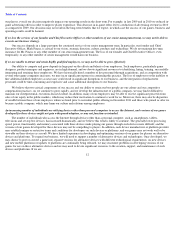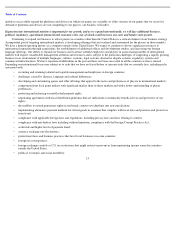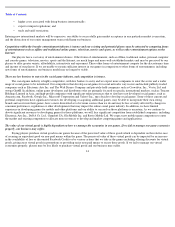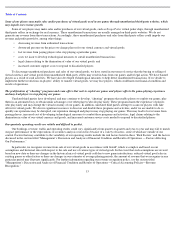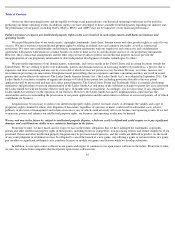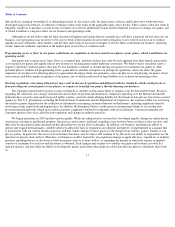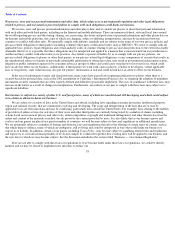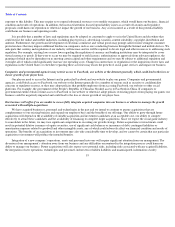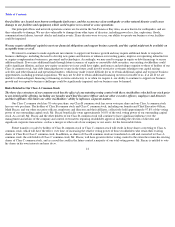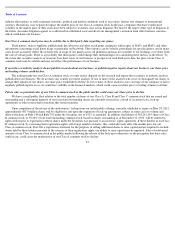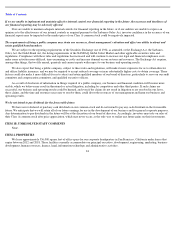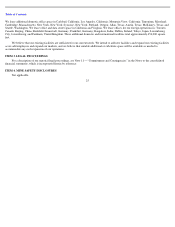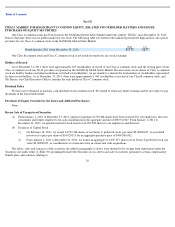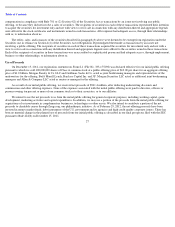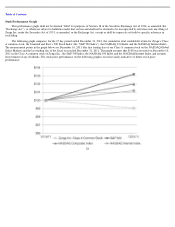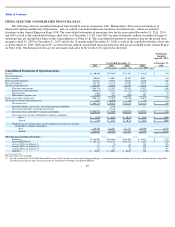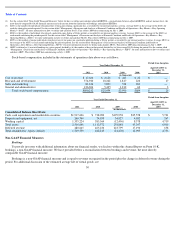Zynga 2011 Annual Report Download - page 24
Download and view the complete annual report
Please find page 24 of the 2011 Zynga annual report below. You can navigate through the pages in the report by either clicking on the pages listed below, or by using the keyword search tool below to find specific information within the annual report.
Table of Contents
vulnerabilities, the diversion of resources from our existing businesses, sites and technologies, the inability to generate sufficient revenue to
offset the costs and expenses of acquisitions, and potential loss of, or harm to, our relationships with employees, players and other suppliers as a
result of integration of new businesses.
Failure in our pursuit or execution of new business initiatives could have a material adverse impact on our business.
Our growth strategy includes evaluating, considering and executing new business initiatives. Executing on new businesses initiatives can
be a difficult task. Although management attempts to evaluate the risks inherent in a particular new initiative, there can be no assurance that we
will properly ascertain or assess all such risks or that subsequent events will not alter the risks that we perceive at the time we decide to pursue
any new business initiative. New initiatives may also divert our management’s attention from other business issues and opportunities. Any
negative events or results that may arise as we pursue new business initiatives may adversely affect our reputation, business, financial condition
and results of operations.
Fluctuations in foreign currency exchange rates will affect our financial results, which we report in U.S. dollars.
As we continue to expand our international operations, we become more exposed to the effects of fluctuations in currency exchange rates.
We incur expenses for employee compensation and other operating expenses at our non-U.S. locations in the local currency, and an increasing
percentage of our international revenue is from players who pay us in currencies other than the U.S. dollar. Fluctuations in the exchange rates
between the U.S. dollar and those other currencies could result in the dollar equivalent of such expenses being higher and/or the dollar equivalent
of such foreign-
denominated revenue being lower than would be the case if exchange rates were stable. This could have a negative impact on our
reported operating results.
The enactment of legislation implementing changes in the U.S. taxation of international business activities or the adoption of other tax
reform policies could materially impact our financial position and results of operations.
The current administration has made public statements indicating that it has made international tax reform a priority, and key members of
the U.S. Congress have conducted hearings and proposed new legislation. Recent changes to U.S. tax laws, including limitations on the ability of
taxpayers to claim and utilize foreign tax credits and the deferral of certain tax deductions until earnings outside of the United States are
repatriated to the United States, as well as changes to U.S. tax laws that may be enacted in the future, could impact the tax treatment of our
foreign earnings. Due to the large and expanding scale of our international business activities, any changes in the U.S. taxation of such activities
may increase our worldwide effective tax rate and harm our financial position and results of operations.
A change in the application of the tax laws of various jurisdictions could result in an increase to our worldwide effective tax rate and a
change in how we operate our business.
Our corporate structure and intercompany arrangements, including the manner in which we develop and use our intellectual property and
the transfer pricing of our intercompany transactions, are intended to provide us worldwide tax efficiencies. The application of the tax laws of
various jurisdictions, including the United States, to our international business activities is subject to interpretation and depends on our ability to
operate our business in a manner consistent with our corporate structure and intercompany arrangements. The taxing authorities of the
jurisdictions in which we operate may challenge our methodologies for valuing developed technology or intercompany arrangements, including
our transfer pricing, or determine that the manner in which we operate our business is not consistent with the manner in which we report our
income to the jurisdictions, which could increase our worldwide effective tax rate and harm our financial position and results of operations.
20




